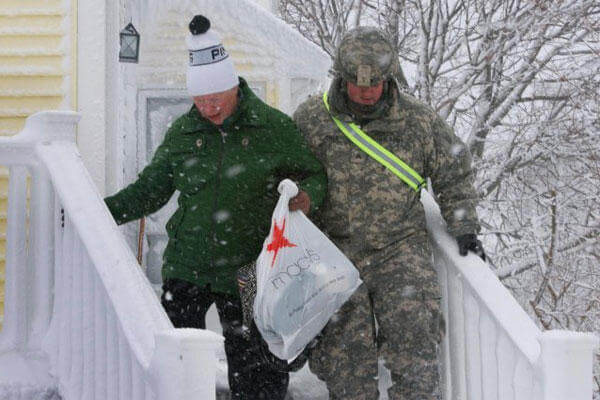ARLINGTON, Va. -- Citizen-Soldiers in the Northeast were assisting state authorities Feb. 9 in the aftermath of Nemo, the giant snowstorm that killed at least five people, left 650,000 without power and resulted in the cancellation of about 5,300 flights.
As of Saturday morning, National Guard troops had been activated in Connecticut, Massachusetts, New York and Rhode Island.
By nightfall, the total number of responding Soldiers was 2,295.
"Our states and communities are again calling and counting on our National Guard to save lives and preserve property as we recover from this storm," Gen. Frank J. Grass, chief of the National Guard Bureau, said Saturday night.
"As I watch our Guard members again step up as they've always done for 376 plus years in peacetime and war, one of my greatest concerns is about the effects sequestration will have on our nation's outstanding National Guardsmen, as well as on our ability to respond to the governors' needs and our federal mission readiness," he said.
"I pledge to every member of the National Guard to work with our DOD partners and our government's executive and legislative branches to preserve resources and structure, to maintain a National Guard that is 'Always Ready, Always There,'" Grass continued.
According to the Associated Press, the blizzard wasn't as dire as the storm of 1978, which longtime New Englanders use as the benchmark for dreadful winter weather.
That was little consolation to the thousands of motorists trapped all night in ice-covered vehicles, awaiting rescue after the snow stopped.
"It's quite an honor to be living in the community, to be part of the community and serve the community," Maj. Gen. L. Scott Rice, the Massachusetts adjutant general, said in an interview with Boston station WHDH-TV.
Rice noted that the storm coincided with a regular drill weekend for his state's troops, so up to 6,000 Soldiers would be available for storm assistance if needed.
Throughout the region, powerful winds were blowing fluffy snow into drifts far deeper than the original 18-24 inches that reportedly fell.
Governors of affected states urged, and in some cases, mandated, that roads be free of civilian traffic so emergency responders and plows could perform their duties unhampered.
Officials lifted those restrictions at 4 p.m., Saturday.
"Most of our best resilience in our communities is your own resilience and the fact that you think about how you prepare and prepare yourself for what could happen," Rice said in the interview conducted from the state's emergency management bunker in Framingham, Mass.
A summary of Guard assignments included:
-- Connecticut: Conducting roadway support, health and wellness checks and emergency transportation throughout the state.
-- Massachusetts: Conducting health and wellness checks, transportation support and sandbagging.
-- New York: Staged in New York City for emergency transportation.
-- Rhode Island: Staged for mobility, transportation, snowplowing, supporting state police, transportation department and power companies.
State emergency declarations were in force in Connecticut, Massachusetts, Maine, New Hampshire, New York and Rhode Island.



























